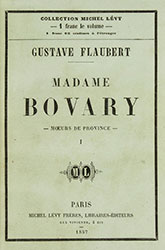Madame Bovary
Critique • Quotes
 First edition
First editionFirst publication
1867
Literary form
Novel
Genres
Literary
Writing language
French
Author's country
France
Length
Approx. 130,000 words
Madame Bovary, c'est nous
Some critics and writers consider it the greatest novel ever. And most consider it the most influential.
Yet, Madame Bovary on first reading may strike the modern reader in English as, well, all right but hardly the best. Somewhat cramped story, a pathetic tale of a provincial woman stuck with silly romantic dreams that bring her ruin. Nicely written but not striking in originality.
How is it possible, this disconnect between professional opinion and our everyday response?
In the first place, we're reading translations of which there are many—some very good and some not so. But even the best would be hard-pressed to do justice to Gustave Flaubert's French prose, if we are to believe the Francophone critics. Of all writers, Flaubert is supposed to have been the most fastidious of stylists, constantly revising the smallest details of his work until every French word, sentence and punctuation mark is the one that expresses exactly what he wants. Translating all that nuance into another language must be impossible.
In the second place, what Madame Bovary introduced into novel writing has been copied by virtually all writers who came after. If Madame Bovary seems like a standard modern psychological novel to us now, it's because it set the standard for modern psychological novels.
Perfected style
In the third and most important place, Madame Bovary, despite telling a tale that can be summarized simply, lays out a much wider story of human experience. It is one of those novels that repays rereading with seemingly new and surprising observations, insights and even characters coming to the fore each time.
Flaubert has perfected in this novel the understated style that implies much for those looking beyond the vivid main narrative, that mentions and directs attention away from the mentions, that exposes with a subtle wave of the magician's hand and then with the other hand hurries the audience on to the next spectacle.
One notices in later readings that Emma Bovary is not entirely ridiculous, that her unrealistic yearnings inspired by romantic literature also have their nobility, that we are sympathetic to her misery.
One sees that the other characters—paragons of earnestness, industry, faith and science—are themselves just as misguided and self-absorbed. One senses other lives and multiple levels of tragedy, though not necessarily recognized as such by society.
And, speaking of society, one feels Flaubert's undiscriminating critique poking into all aspects of social life.
Literary folks like to point to the psychological aspects of the novel—how Flaubert gets into the heads of his characters, yet moving the point of view around among them, nearly seamlessly. And this is indeed amazing for his time. But we've seen it done so often since then that few of us can get excited by this.
But what is incredible is that we can still read Madame Bovary (repeatedly) and be stirred and educated by the human story, over and above all its literary virtues. We still find our own depths in it.
— Eric
Critique • Quotes

